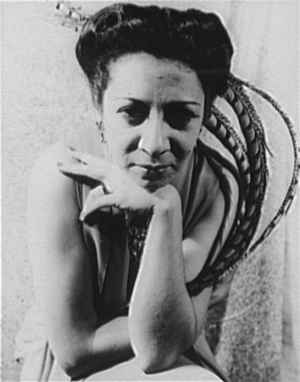


Elsie Houston
Photo: Carl Van Vechten
Source: Famosos Que Partiram
The first Brazilian musician to perform abroad was flautist, Pixinguiha, with the band, Os Oito Batutas, venturing to Paris in 1922. But not until Elsie Houston did Brazilian music really acquire international status. A carioca born in Rio de Janeiro on 22 April 1902, Houston came from a family of plantation owners who had traded the United States for Brazil after the Civil War (confederados). Her father, however, was a dentist. Houston studied voice internationally, first in Germany, then Argentina, then Paris. Being something financially advantaged, Houston kept artistic society with such as composer, Heitor Villa-Lobos, and various painters, her husband for a brief period the poet, Benjamin Péret.
Houston's first performance was in 1926 at a Paris solon hosted by Marguerite and Raoul d'Harcourt. Her first public engagement was a year later, also in Paris, at the Salle Gaveau, with pianist, Heitor Villa-Lobos. Houston made her first recordings with Villa-Lobos in Paris in 1928, also marrying the poet, Benjamin Péret, that year on an unidentified date. Her first tracks with Villa-Lobos were for French HMV (His Master's Voice), four short tunes composed by Villa-Lobos titled 'Desejo', 'Na paz do outono', 'Realejo' and 'Estrela do céu é lua nova'. Those are available as the initial four tracks on the album, 'Elsie Houston: Queen of Brazilian Song'.
'Estrela é lua nova' Elsie Houston w piano by Heitor Villa-Lobos
Recorded on 20 June 1928 in Paris Issued on Gramophone BT4111-1
Composition: Villa-Lobos
Upon Houston's return to Brazil she made her theatre debut at the Municipal Theater of São Paulo, performing in 'Canção do Carreiro' with music by Villa-Lobos and text by Dora Vasconcelos. In 1929 she and Péret traveled Brazil to study indigenous folk songs of which she delivered an account in the book, 'Chants populaires du Brésil', written by request of the International Committee of the League of Nations of the Sorbonne and published in 1930 as the first of a series. Her recordings of 1930 for Columbia were sessioned in Brazil.
'Macumbagele' Samba by Elsie Houston w Gao & Zezinho e Petit
Recorded March 1930 Matrix 380606-1 Issued on Columbia 5182-B
Music: Lilico Leal Lyrics: J. da Paulicéia
'Morena cor de canela' Samba by Elsie Houston w Zezinho e Petit
Recorded 1930 Matrix 380649 Issued on Columbia 5217-B
Composition: Ari Kerner
'O barão da Bahia' Elsie Houston
Recorded Sep 1930 Matrix 380830-1 Issued on Columbia 7014-B
Composition: Maria Amélia Barros
'Puxa o Melao Sabia' Elsie Houston
Recorded Dec 1930 Matriz 380831 Issued on Columbia 7050
Composition: Traditional arranged by Houstons
'Capote do Mangô é teu' Samba by Elsie Houston w the Orquestra dos Batutas
Recorded 7 Dec 1931 Issued on Victor 33520-A
Composition: Pedro da Conceição
As Péret was a Communist, he was expelled from Brazil as an agitator, leaving port back for Paris on 20 December 1931. Houston thus found herself back in France with him where she laid more tracks for French HMV on 26 September 1933. Back in Brazil in 1935, she bounced back to Paris, now separated from Péret (never divorced), before migrating to New York City in 1937 where she first recorded in New York City in 1938 and 1939, followed by numerous sessions in 1941. Houston remained in New York to the end of her career, appearing in all variety of venues from cabarets to private gatherings to stadiums, as well as radio. Howsoever, disappointment as to her career, financial difficulties and romantic complications are all mentioned as external possibilities in the equation to her suicide in NYC on 20 Feb 1943 at age forty.
Sources & References:
Ronald Radano & Tejumola Olanijan (Audible Empire / Duke U Press 2016)
Marcelo Ferreira Gomes Melo e Silva (Villa Lobos’ 'Canções típicas brasileirase')
Audio: BNF Gallica
Chants populaires du Brésil (1930):
Recordings by Elsie Houston:
Cats / Discos:
Compilations: Queen of Brazilian Song (1928-1941 / Marston 51011-2):
MusicWeb International
Sessionographies:
Other Profiles:
Elsie Houston:
Benjamin Péret (husband)
Heitor Villa-Lobos (musician):
Classical Main Menu Modern Recording
hmrproject (at) aol (dot) com